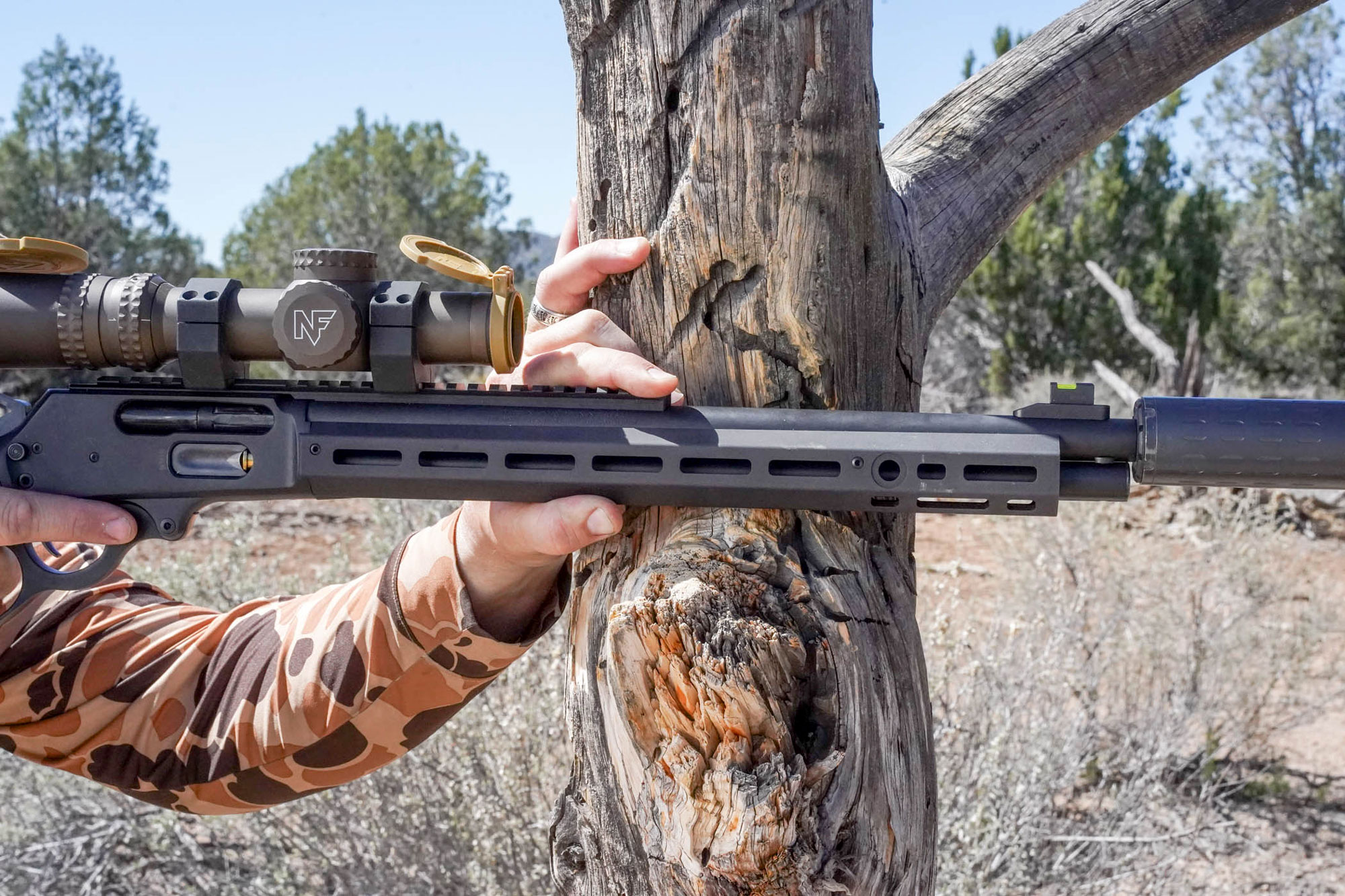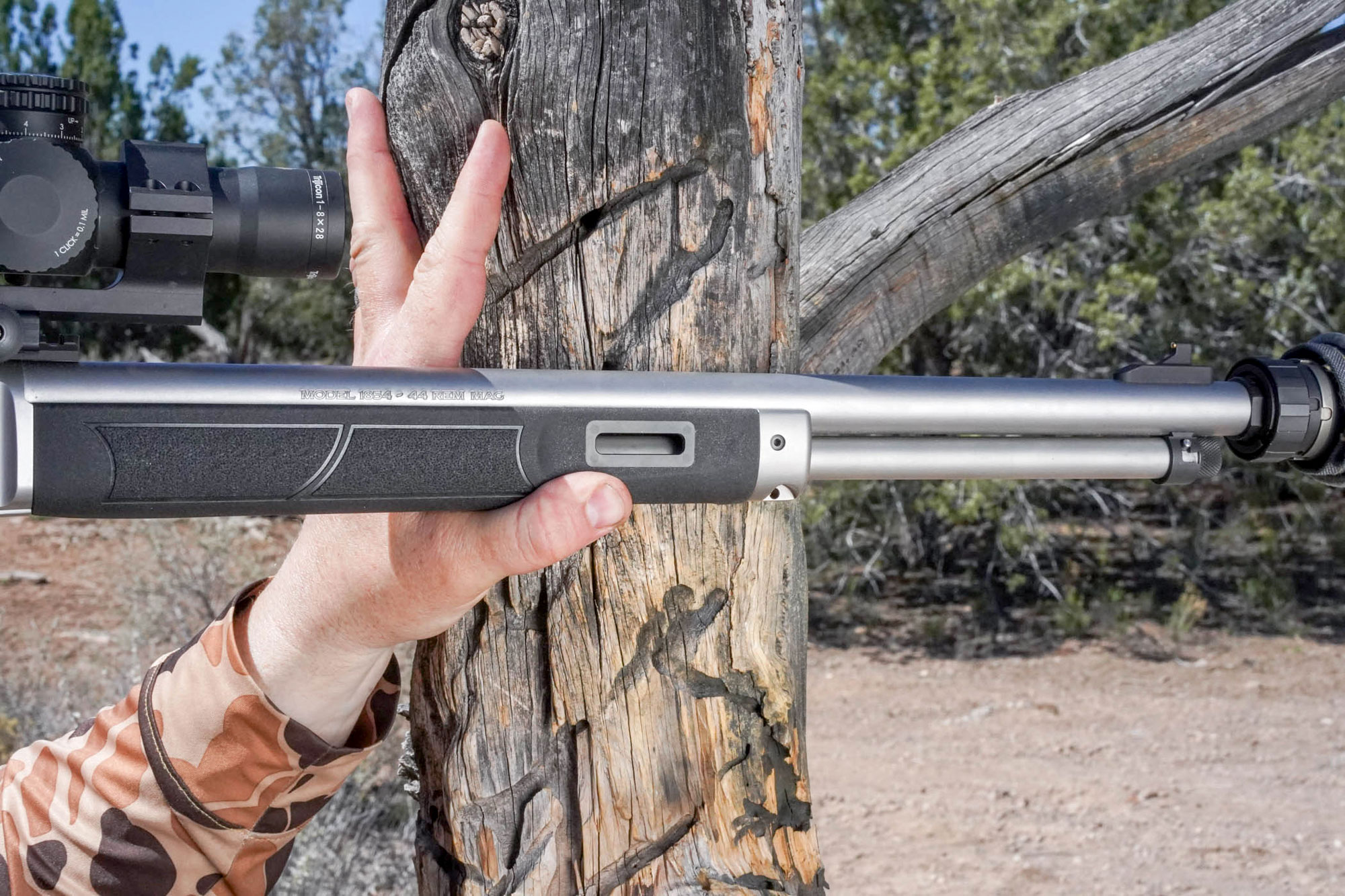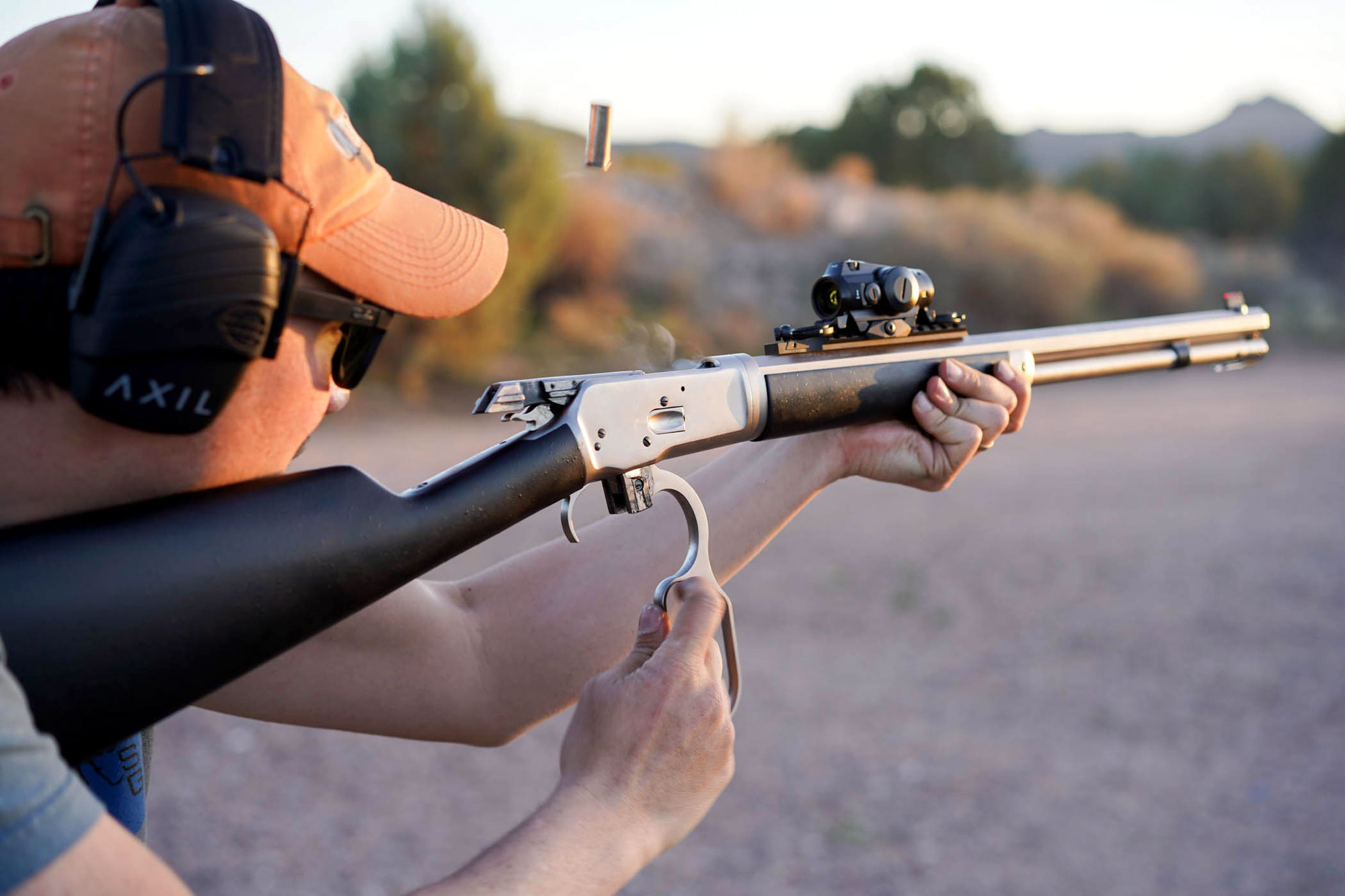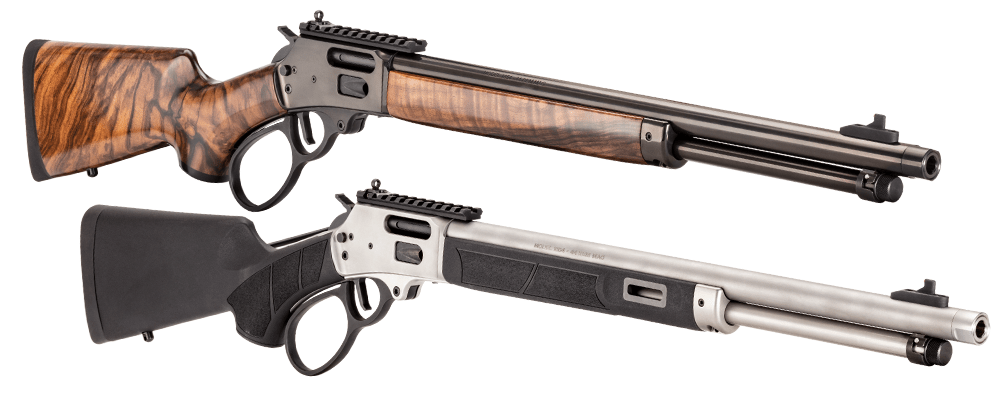The lever action rifle was one of our earliest repeaters, and has held a place among America’s more popular firearm platforms since the Civil War. Many things have changed in the past 160 years, but the lever gun has remained. It’s been a steadfast companion for cowboys and deep-woods deer hunters alike, and is now serving an entirely new subculture of shooters: the tactical crowd. Traditionally styled lever guns haven’t gone anywhere, but feature sets from popular platforms like the Armalite Rifle have been seeping into lever gun designs. These sleek, futuristic-looking guns provoke conflicting reactions from modern and traditional-minded shooters, but who’s right? Can the tactical lever action do anything Grandpa’s hand-me-down can’t?
What Is a Tactical Lever Action Anyway?
As often happens, terms like “tactical” develop their own connotation depending upon the culture and context in which they’re used. When someone refers to a lever gun — or any other gun — as “tactical,” what do they really mean?
To most people, “tactical” is defined by what the gun looks like. Many of the gun designs and features we label “tactical” in 2024 have their roots in military combat tactics, but many features have also been refined in competitive shooting sports. The classic M1 Garand and M1 Carbine are tactical rifles by definition, but a valid interpretation of what shooters today would say is that a tactical gun incorporates military-like features, accessories, and finishes similar to what you’ll find on AR-style rifles.
Lever guns incorporating some of these modifications are met with mixed feedback. Many appreciate the history, legacy, and beauty of a wood-stocked lever action with a worn blued finish or a handsome color case-hardened specimen and think less of the tactical lever action.
Lever guns are supposed to be hunting rifles, and tactical lever actions are fighting rifles — or so some think. They would likely have a different opinion had they been among the Graybacks when Henry rifles started showing up on the Union lines. In that time and context, they were indeed tactical. Even silver screen heroes like Chuck Connors put a very tactical emphasis on their lever guns. In fact, if Hollywood were the only input, we’d clearly label the lever action as a fighting rifle.
Today, most would agree that there are several features that generally define a tactical lever action as opposed to a traditional lever action. Most of these features revolve around optimizing the gun for accessories. They include, but are not limited to the following:
- M-Lok slots and/or Picatinny rail on handguard
- QD Sling cups
- Ghost Ring Sights and Picatinny optic rail
- Threaded muzzle
- Cerakote or other weather-resistant finish
The Tactical Lever Action Is More Versatile
The lever-action rifle has always been a versatile platform. In the early days, it was a more accurate repeater that often used the same cartridges as a gunner’s revolver. The lever action has been found on the battlefield, in saddle scabbards, and behind dusty truck seats. It’s been used for personal protection, pest control, hunting, recreational shooting, and more.
As good as classic-style lever actions are, there are certainly ways that they can achieve better utility. Even if you despise the flat-dark-earth and black tones along with the rails and gizmos, some of these features undeniably make lever guns more effective in a variety of situations.
Optics Compatibility
Folks have been mounting optics on lever guns for quite some time, but optics and sights have come a fair piece since grandpa scoped up that Marlin 336 in .35 Remington. We have a slew of suitable optics for tactical lever actions that include LPVOs, Red dots, and holographic sights. Hell, an avid hog hunter might want to use a thermal scope. The tactical lever action takes advantage of these platforms by including a Picatinny rail atop the receiver — or being compatible with one.
Many modern lever guns include quality high-viz sights and rails from companies like XS Sights and Skinner Sights, but it’s their instant compatibility with so many optics that gives them an advantage. Many optics are fast-pointing with long eye relief so you won’t need to bother with a clunky hammer spur.
This optics advantage certainly does play to the tactical or self-defense application for lever guns, but is applicable in many hunting scenarios too. For example, the simple scout-style rail on the Taylor’s & Co. 1892 Takedown .44 Mag., when fitted with a small red dot, improves speed and precision greatly, something that’s handy in bear country or when hunting in thick cover.
M-Lok, Pic Rails, and Accessories
A tactical lever action will usually incorporate at least some M-Lok or Picatinny rail — both of which are for accessory mounting. M-Lok is simply a specifically-sized slot, or series of slots, that mate with accessories featuring small tabs that go through the slot and lock the item into place. Picatinny rail is a common cross-slotted rail onto which many accessories can be attached.
Here are a few of the useful items you can attach to a tactical lever action:

QD Sling Cups
QD sling cups are common on some of the newer tactical lever action rifles, and they’re a godsend. They’re more effective, quieter, and less obtrusive than traditional swivel studs.
Threaded Muzzles
Lever actions also happen to make great suppressor hosts, and running a can on your tactical lever action makes it more pleasant and easier to shoot accurately. Many suppressors like the Silencerco Omega 36M and Hybrid 46M allow you to install a muzzle brake on the gun and attach the suppressor over top of that brake. Even for hunters, there are lots of short, lightweight cans like the .30-caliber Banish Backcountry that make a lever action even more fun to hunt with.

Advantage of Advanced Coatings
Many lever guns that fall into the tactical category come with DLC or Cerakote finishes, which make them highly resistant to moisture and other elements. We can all appreciate the beauty of a deep blued finish, but these stand up to hard use better — and you’re not buying a tactical lever action to be a safe queen you take out to admire on special occasions.
Legal in All States
Despite being genuinely useful for defensive and general truck-gun applications, lever actions are often overlooked in favor of AR-style rifles. That’s understandably so, but in states and areas with tight gun restrictions, a tactical lever action can be a great option for a defensive long gun. Rifles chambered in .44 Mag., .357 Mag., or similar can hold a lot of ammo and are potent out of a rifle barrel inside 100 yards. When fitted with well-thought accessories and configured smartly, the tactical lever action is a formidable rifle in the hands of a practiced individual.

An Ideal Truck Gun?
For some folks, a tactical lever action is the ultimate truck gun — which is essentially a do-all rifle that lives in your vehicle. These would be the rifles you’d see hanging on window racks or, more judiciously, stowed behind the seat or in the gun sleeve of those old woven-blanket-pattern seat covers that grandpa had.
These lever guns are jacks of all trades, and their modern coatings and materials help them stand up to both abuse and the dusty neglect that a truck gun is often subject to. They are slender and stow easily, but are quick to bring into action when needed.
Many vehicles aren’t set up like a 1974 Ford pickup anymore, but there are really handy rifle storage systems for modern vehicles too — like this one I’ve been using from Grey Man Tactical, which secures the rifle to the back of a seat.

Top Tactical Lever Action Rifles
There are a number of manufacturers producing what I’d call tactical lever actions, and even more custom builders and tinkerers modifying Henrys and Marlins. Here’s a look at some of the standouts in the field:
Marlin 1895 Dark Series
Caliber: .45/70 Government
Barrel Length: 16.1 inches
Capacity: 4+1 rounds
Smith & Wesson 1854
Caliber: .44 Mag./.44 Special
Barrel Length: 19.25 inches
Capacity: 9+1 rounds
Henry X Model
Caliber: .410 Gauge (.45/70, .45 LC, .44 Mag, .327 Federal, .30/30, and others available)
Barrel Length: 19.8 inches
Capacity: 4+1 rounds
POF Tombstone
Caliber: 9mm Luger
Barrel Length: 16.5 inches
Capacity: 20+1
FAQ
Lever action rifles can be quite good for self defense. They are accurate at close range, many don’t recoil badly, and they can be cycled quickly.
Browning chambers their BLR lever-action rifle in .300 Win. Mag., but, most commonly, the .45/70 is the most powerful round you’ll see in a wide variety of tactical lever actions.
Final Thoughts on The Tactical Lever Action
Many classic lever gun fans don’t care for the looks of the tactical lever action, but they are free to never buy one. The disapproval by some doesn’t negate the practical advantages that these smart tactical features give the rifle. The added flexibility makes them more apt to tackle a variety of duties — and to do it better. As for my opinion? I think anything that stokes the shooting public’s interest in the lever gun is a good thing.




